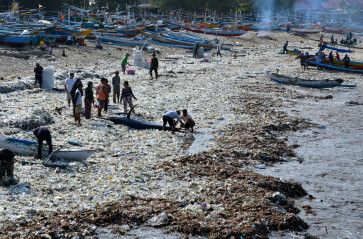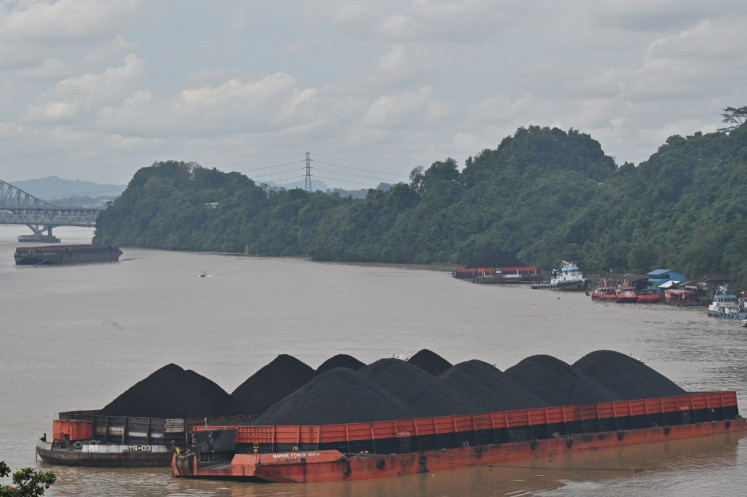Maritime dispute to be solved soon
Indonesia is optimistic that an outstanding maritime tussle with China will be resolved soon amid a prevailing impasse over most maritime disputes in the South China Sea (SCS)
Change text size
Gift Premium Articles
to Anyone

I
ndonesia is optimistic that an outstanding maritime tussle with China will be resolved soon amid a prevailing impasse over most maritime disputes in the South China Sea (SCS).
The country is “doing quite okay” in addressing a recent spat with one of its largest trade partners, a senior political and security minister said, as both countries are seeking a mutual solution to a sensitive problem.
However, fearing the unnecessary flaring of tensions that might arise from excessive media coverage, Coordinating Political, Legal and Security Affairs Minister Luhut B. Panjaitan refused to reveal the results of his recent meeting with top Chinese officials in Beijing.
“I made an agreement with minister Meng [Jianzhu] not to disclose stories [like the Natuna incident]; we will resolve things under the table,” Luhut told reporters on Friday, insisting that results of the ongoing negotiations would soon become apparent.
Luhut met Meng Jianzhu, the head of the Chinese Communist Party’s central commission for political and legal affairs, during a visit late April to China, having made clear his intention to resolve the Natuna incident from the outset.
Jakarta previously accused Beijing of obstructing law enforcement when large Chinese coast guard vessels intercepted an Indonesian patrol boat towing the 2,000-gross-ton Kway Fey 10078, a Chinese fishing boat caught operating illegally near the Natuna Islands at the southern end of the SCS.
The Kway Fey, which was being towed to the nearest naval base, was rammed by an armed Chinese coast guard vessel at the borders of Indonesia’s Exclusive Economic Zone (EEZ), sustaining damage that prevented it from being impounded.
The fishing boat was later towed away by the larger Chinese coast guard vessels, depriving Jakarta of an important piece of evidence.
Beijing later reiterated its stance on the Natunas, conceding Indonesia’s full sovereignty over the islands, a stance it immediately contradicted when it also demanded that the eight Chinese crew members operating the Kway Fey to be released from detention, claiming they were fishing well within China’s “traditional fishing grounds”.
This assertion, which is not recognized by international law, has raised questions about whether these fishing grounds overlap with the contested Nine-Dash-Line, Beijing’s basis for its unilateral claim to most of the SCS.
Jakarta dealt with the incident first and foremost as a violation of the fisheries law, despite the larger subtext of Indonesia possibly becoming engrossed in the overlapping boundary disputes in the area.
I Made Andi Arsana, a geospatial expert on the law of the sea, has conducted a litmus test of sorts on the SCS dispute, drawing out a map with Jakarta’s and Beijing’s claims that effectively shows the location of the Natuna incident.
As a result, the location where the Kway Fey was found trespassing in Indonesia’s EEZ corresponds to an area within China’s tentative Nine-Dash-Line, proving the suspicions of a number of experts and government officials alike.
Andi said the Natuna incident could be seen as Beijing figuratively testing the waters, as hinted by the quick response of the Chinese coast guard vessels to the capture.
“When the Chinese vessel was seized, a couple of large ships followed soon after to seemingly ‘escort’ the vessels. This created a perception that Beijing might have deliberately sent Chinese fishermen into a ‘disputed’ region in order to consolidate its presence,” the Gajah Mada University (UGM) lecturer said.
He also pointed out that similar incidents occurred in 2010 and 2013, also in the same area.
Meanwhile, Luhut was adamant that Indonesia’s standing on the SCS dispute had not shifted — that it remains a neutral, non-claimant state.
“I think the position of Indonesia is very clear: [...] we don’t recognize the nine lines and we disagree about the power projections in that area,” he said.
Vietnam, Malaysia and the Philippines, who are all Indonesia’s immediate neighbors, have overlapping claims in the SCS and are in overdrawn talks with China to devise a code of conduct (CoC) in the disputed region.
Indonesia has thus far tried to act as an honest broker. “We are not a part of this issue, but we agree [it should be] settled peacefully,” he said while also emphasizing Indonesia’s full rights over the Natunas and its EEZ.









